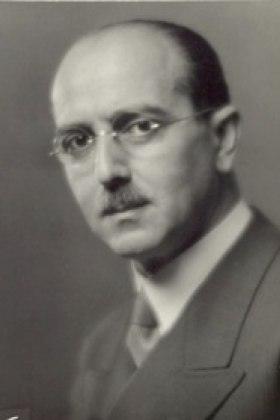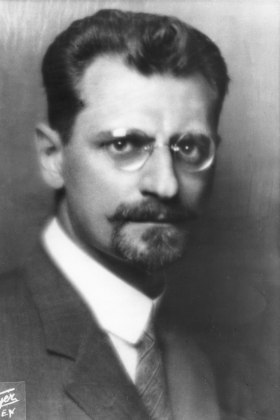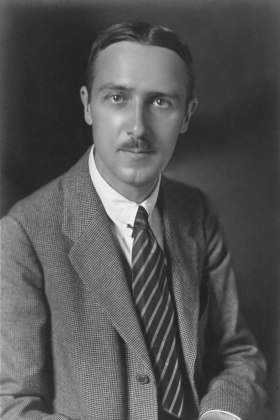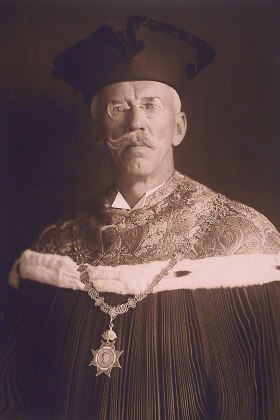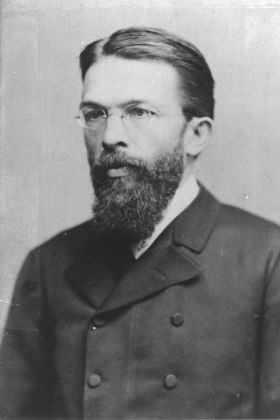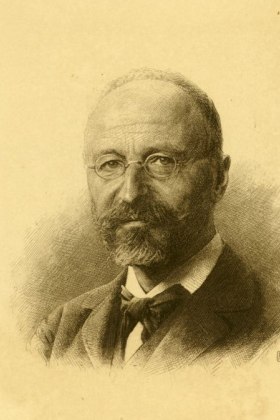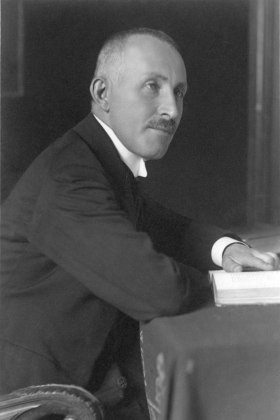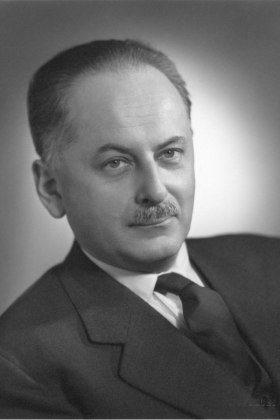Law and Economics, part II
More than any other institution of the University of Vienna, the Faculty of Law and Economics was hit by the political transformations of the 20th century. More than half of its professors were retired after 1938; two were killed at the Theresienstadt concentration camp. After the Austrian republic’s reestablishment in 1945, the faculty existed for another 30 years, until it was divided into smaller entities in 1975. Today, the Faculty of Law as well as the Faculty of Economics and the Faculty of Informatics stand in the old institution’s tradition.
With the curriculum of 1893, the two public law disciplines of constitutional and administrative law became mandatory subjects in the study of law, and since then have seen a rise in importance. For a long time, however, people were critical of these disciplines becoming established in the curriculum. Because of this, it was suggested to introduce a separate course of studies in addition to the existing one, namely that of “state science”. This plan was implemented together with the reform allowing women to enter the study of law in 1919. The new course of studies was focused less on the requirements of Austrian jurisprudence, and instead taught public law and the economic disciplines. It was possible to study “state science” until 1966, when it was replaced by the study of political economics and the study of sociology at the Faculty of Law and Economics.
Hans Kelsen was the most important expert on constitutional law in the First Republic, who became known to the public mainly through his work on the Austrian federal constitution of 1920. He founded the “Viennese school of legal theory” at the Faculty of Law and Economics, among whose students were such people as constitutional law expert Adolf Julius Merkl, as well as international law expert Alfred Verdroß. This school was also called the “Pure Theory of Law”, due to one of its main goals being to separate academic statements about law both from actual (sociological) conditions as well as from political demands towards the legal system. Not least due to anti-Semitic animosity at the faculty, Kelsen left Vienna in 1930, leaving his school to gradually dissolve.
The Pure Theory of Law’s academic positioning can be explained with the endeavor of many other jurists of the time to not only want to study the law allegedly divorced from the real world, but also to explore “real life”. This movement had a great impact, particularly on penology, which was attempting to link itself to other criminal sciences, such as criminology and criminalistics. At the urging of Wenzel Gleispach, an “Institute for all Penology and Criminalistics” was founded in 1923, which had its home in Liebiggasse under various changing names until 2006.
The Austrian School of National Economics established by Carl Menger (civil proceduralist Anton Menger’s older brother) – also called “Marginal Utility School” due to its microeconomic approach – received international recognition. It reached its peak at the University of Vienna in the years before the First World War, when Eugen Böhm von Bawerk taught here. Meanwhile, the most important representative of the Austrian School in the inter-war period, Ludwig (von) Mises, did not receive a chair in Austria before he emigrated in 1934. Instead, a declared critic of the Austrian School, Othmar Spann, had been appointed to the Viennese Faculty of Law and Economics in 1919 as a professor of national economy and social science. Spann’s economic theories, however, had less relevance than his sociological theories, which became the breeding ground for (Austro-)Fascist ideologies. Nevertheless, Spann also lost his chair in 1938 and was interned in the Dachau concentration camp.
From everything mentioned above it already becomes clear that the Faculty of Law and Economics was strongly involved in the political battles of the inter-war period. Following the coup of 1933, several faculty members wrote critical essays for a Reich-German magazine. Three of them – Wenzel Gleispach, Max Layer and Karl Hugelmann – were forced into retirement because of this, either directly or indirectly. The National Socialist era, however, had an even greater impact on the faculty’s personnel, when more than half of all professors and lecturers lost their chairs, were forced into retirement or lost their teaching license. Many of them emigrated, many were arrested. Roman law expert Stephan Brassloff and commercial law expert Josef Hupka lost their lives in the Theresienstadt concentration camp in 1943 and 1944, respectively.
In 1935, the study of law had experienced a large reform, in which the ideology of the corporative state ( "Ständestaat") could clearly be seen, for example in lectures on Christian legal philosophy. The curriculum introduced at the Austrian faculties of law in 1939 saw a complete change in the traditional subjects; the subject matter was no longer to be taught in “abstract” disciplines, but instead should be structured according to “life issues” (“people”, “class”, “nation”). In 1945, the curriculum of 1935 was reinstated with certain changes and remained in effect in this form until 1981.
Of those professors displaced in the National Socialist era, only a small number returned to the faculty, among them Adolf J. Merkl, Ludwig Adamovich and Willibald Maria Plöchl. At the same time, also only a small number of the professors teaching during National Socialism were permanently removed from the university after 1945 (such as Ernst Schönbauer, who had been Dean from 1938 to 1945).
The Pure Theory of Law, which threatened to die out after Merkl’s and Verdroß’s retirement in 1960, was brought to a second prime by Merkl’s student Robert Walter. His academic antipode was particularly civil law expert Franz Bydlinski, who represented the so-called principle-based jurisprudence, which in contrast to the Pure Theory of Law is of the opinion that the highest values, such as justice, can be perceived through rational means. Both founded schools that are still active at the faculty today.
In 1975, the faculty was split into a Faculty of Law and a Faculty of Social and Economic Science. The latter was divided up into increasingly smaller units in 2000 and 2004. Today in particular the Faculties of Economics and Informatics can trace their origins back to it. The study of law was fundamentally reformed in 1978 and organized into a diploma- and a doctorate course. The former was meant to enable students to qualify themselves for the “classic” legal professions (judge, lawyer, notary, civil servant), while the latter was more academically focused and now again required a dissertation. Smaller reforms followed in 1999 and 2006; a three-tiered system in accordance with the Bologna process was rejected by both the faculty as well as representatives of the legal professions.
Last edited: 05/22/19
-
Law and Economics, part I
1365–1900
-
Hans Kelsen
-
Adolf Julius Merkl
-
Alfred Verdroß-Droßberg
-
Wenzel Graf von Gleispach
-
Carl Menger von Wolfensgrün
-
Anton Menger von Wolfensgrün
-
Eugen Böhm Ritter von Bawerk
-
Ludwig von Mises
-
Othmar Spann
-
Karl Gottfried Hugelmann
-
Max Layer
-
Stephan Brassloff
-
Josef Hupka
-
Ludwig Adamovich sen.
-
Willibald Plöchl
-
Ernst Schönbauer
-
Robert Walter
-
Franz Bydlinski



